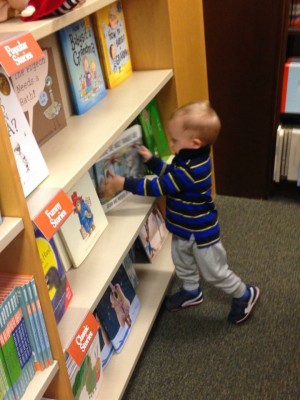
Readers are not born, they are raised on the knees of their parents. An interest in reading and a love of stories has to be actively fostered from a young age and supported well into the teenage years.
Children who are introduced early to the delights of reading gain very definite advantages and benefits over those less fortunate. Current research supports clear links between literacy and numeracy and language skills are certainly enhanced by being read to each day. The pleasure of sitting quietly together to share a story is also surely one of the simple joys of child-rearing for a parent. But sometimes it can be difficult to know where to start with reading and toddlers. Try some of these simple ideas to turn your little wriggle-worm into a book-worm!
Be a book reading role model:
It is so important to be seen reading yourself. Small children want to emulate you and the bigger ones watch everything you do and can see what you value. If you want your child to be a reader, you must be one yourself. The quiet joy to be found in reading needs to be promoted and modelled as a valuable way to spend time, no matter what your age. Read a newspaper, a magazine, a cookbook, a novel …. but be seen reading! Our teachers sit and read alongside our teens – it sends an unambiguous and important message about the value we put on reading.
Find appropriate books:
It is hard to capture a child’s attention with a book that is of no interest or relevance to them. Age-appropriate and engaging choices are the key to capturing a child’s interest in reading at any age. Tap into your little ones’ interest in dogs or trucks or fairies to hook them into books and reading by sharing stories with these subjects. Seek advice from other parents, bookshops, local libraries, parent blogs and the net, to find popular and relevant books for their age group.
Favourite books are important:
Once a child expresses interest in a particular type of story or author – then provide more of the same to capitalise on their current interests and enthusiasms. They may love a special character, lift-the-flap books or rhyming stories by a particular author. Sometimes it is tedious to read Peppa Pig for the umpteenth time, but by catering for their tastes at this developmental stage, you are building a long term reader.
Read Aloud:
It is very important to continue to read to children beyond the stage when they can read for themselves. All children (and many adults – witness the rise of popularity of audio books) enjoy being read to. The closeness and sharing of this activity creates warm memories and builds positive attitudes to reading. Children also benefit from hearing the cadence, rhythm, expression and correct pronunciation of an accomplished reader. Our high school kids regularly have stories read aloud to them in the library and you can see by their body language and the pleasure on their faces, that they still enjoy sharing stories in this way, despite their age and skills as independent readers themselves.
Visit Libraries and bookshops:
Make these activities part of your family routines. The range of titles and extra activities on offer will capture the attention of the most reluctant of readers. Taking children to places that value books and reading also encourages them to see themselves as readers – a very important contributor to long term literacy success. Keep in mind too, that public libraries often offer holiday reading programs and activities to engage children during the breaks from school– all valuable supports for beginning and established readers.
Loris Phair – Teacher Librarian at Hillbrook Anglican School, Enoggera.
This article was published in Issue 11 of our print magazine, August/September 2015.

